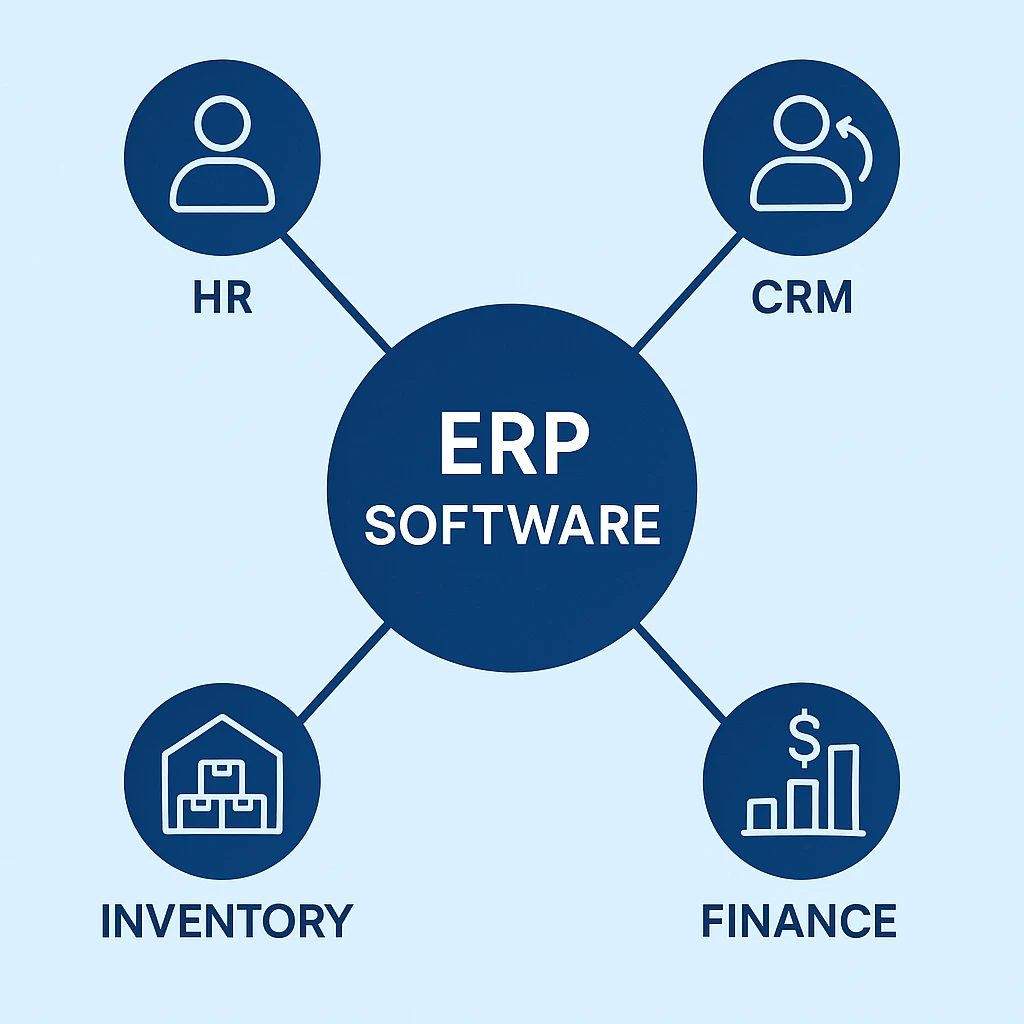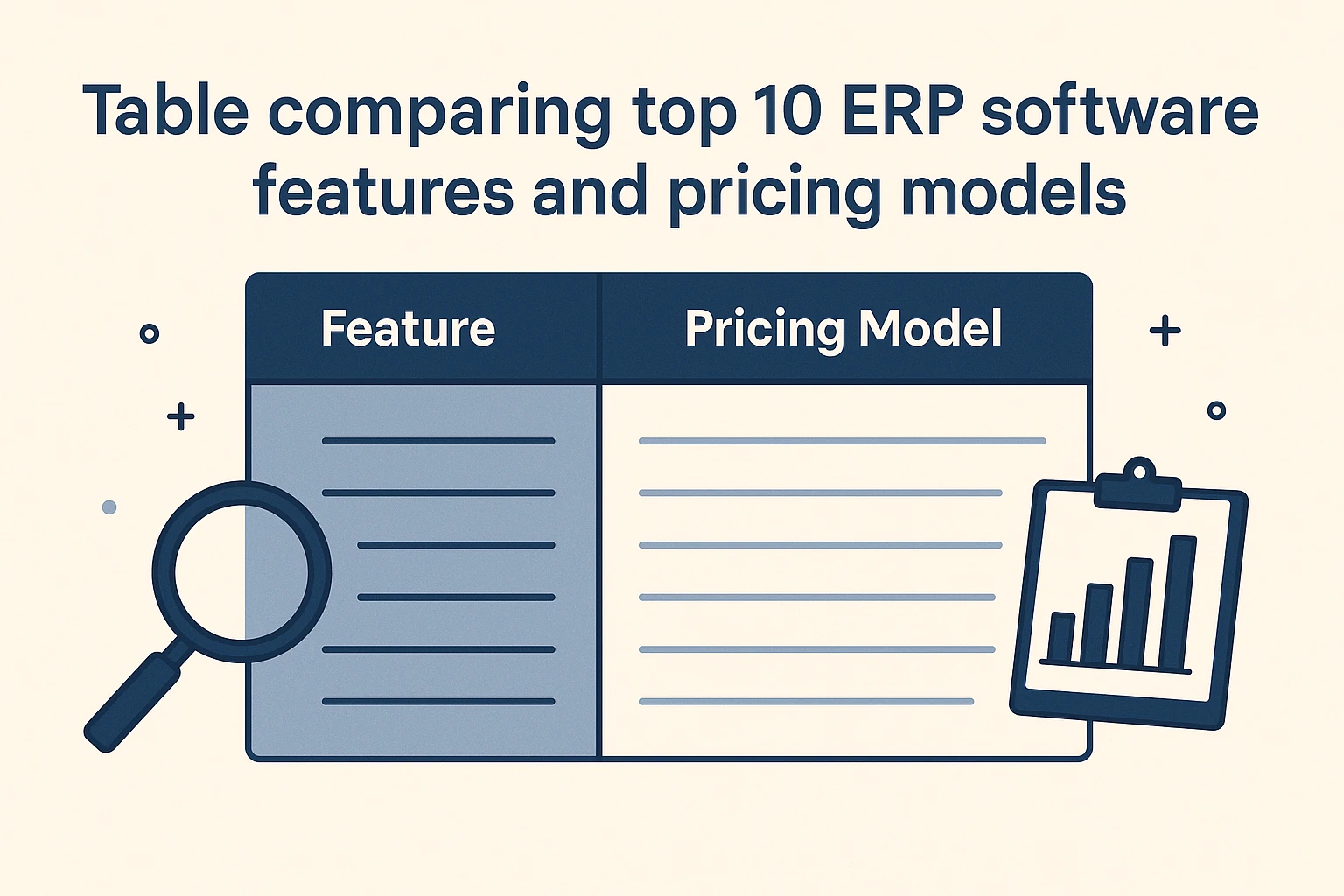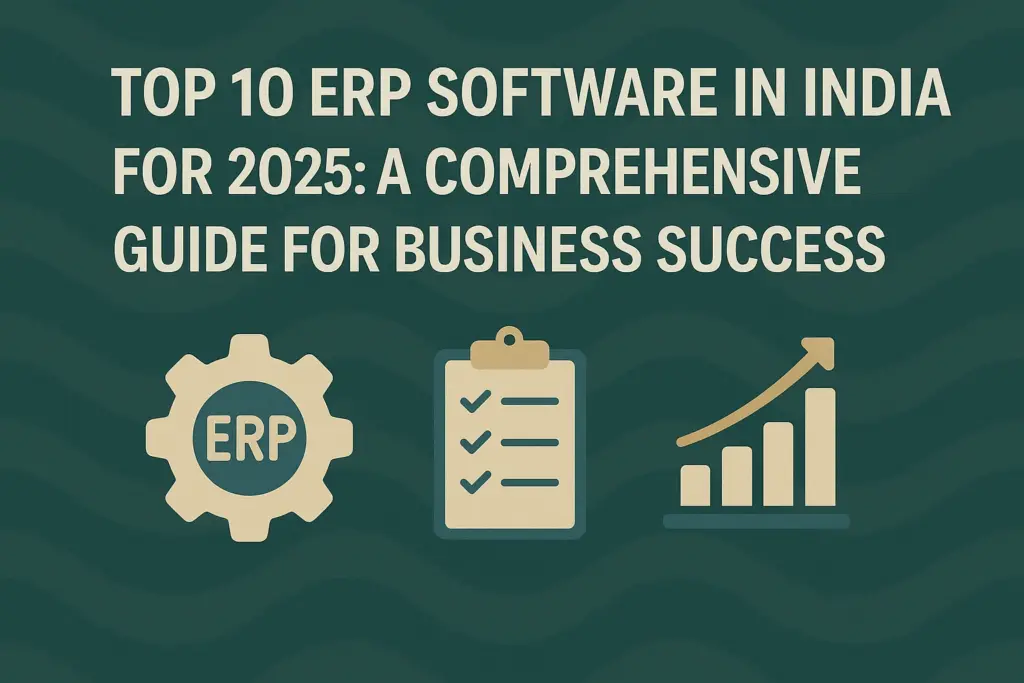Top 10 ERP Software in India for 2025
In the dynamic landscape of Indian businesses, adopting the right ERP (Enterprise Resource Planning) software is critical for streamlining operations, enhancing efficiency, and fostering growth. As industries from manufacturing to services digitize rapidly, the demand for robust ERP solutions in India is at an all-time high. Choosing the best ERP software of India can empower companies to stay competitive and agile in today’s fast-evolving market
In this guide, we analyze the Top 10 ERP Software in India for 2025, their features, pricing models, deployment types, and suitability for different business sizes.

Why ERP Software is Crucial for Indian Businesses
ERP software unifies various business processes into one system — accounting, HR, supply chain, CRM, and inventory management. Especially in a competitive market like India, an efficient ERP system can:
- Improve operational efficiency
- Offer real-time data insights
- Enable scalability
- Ensure compliance with Indian tax laws (like GST)
1. SAP S/4HANA
- Deployment: Cloud and On-Premise
- Best For: Large Enterprises
- Key Features: Real-time analytics, AI-driven automation, extensive localization for Indian tax structures
- Pros: Global standard, highly customizable
- Cons: High cost and complex implementation
2. Oracle NetSuite ERP
- Deployment: Cloud
- Best For: SMEs to Large Enterprises
- Key Features: Financial management, CRM, supply chain, eCommerce integration
- Pros: Comprehensive features, easy scalability
- Cons: Requires customization for Indian SMEs
3. TallyPrime
- Deployment: On-Premise
- Best For: SMEs and startups
- Key Features: Accounting, GST compliance, inventory management
- Pros: Extremely popular in India, affordable
- Cons: Limited advanced features compared to larger ERP systems
4. Microsoft Dynamics 365 Business Central
- Deployment: Cloud
- Best For: Mid-size Businesses
- Key Features: Financials, sales, service, project management
- Pros: Seamless Microsoft ecosystem integration
- Cons: Moderate learning curve
5. Zoho ERP
- Deployment: Cloud
- Best For: SMEs
- Key Features: CRM, finance, HR, analytics
- Pros: Cost-effective, Indian market focus
- Cons: Limited scalability for very large enterprises
6. Infor ERP
- Deployment: Cloud and On-Premise
- Best For: Manufacturing and Distribution Companies
- Key Features: Supply chain, financials, workforce management
- Pros: Industry-specific solutions
- Cons: Customization can be complex
7. Epicor ERP
- Deployment: Cloud and On-Premise
- Best For: Manufacturing, retail, and distribution sectors
- Key Features: CRM, financials, production management
- Pros: Strong industry focus
- Cons: Less local support in India
8. Ramco ERP
- Deployment: Cloud
- Best For: Large enterprises and global companies
- Key Features: HRM, logistics, manufacturing, finance
- Pros: Deep Indian compliance features
- Cons: Complex setup for smaller businesses
9. Sage X3
- Deployment: Cloud and On-Premise
- Best For: Medium to Large Enterprises
- Key Features: Finance, supply chain, production
- Pros: Highly customizable
- Cons: Requires skilled consultants for implementation
10. Marg ERP 9+
- Deployment: On-Premise and Cloud
- Best For: SMEs, Retail, Pharma, Distribution
- Key Features: GST billing, accounting, inventory
- Pros: Industry-specific features for Indian SMEs
- Cons: Less robust for large-scale enterprises

ERP Adoption Trends in Maharashtra: Spotlight on Mumbai and Pune
Maharashtra, especially Mumbai and Pune, is leading ERP adoption trends in India. With a booming manufacturing sector in Pune and a growing services industry in Mumbai, ERP software is critical for:
- Streamlining supply chain operations
- Improving financial transparency
- Enhancing HR management
Cloud-based ERP adoption is particularly strong, helping companies scale operations without heavy infrastructure investment.
Comparison Table: Top 10 ERP Software in India (2025)
| ERP Software | Best For | Deployment | Unique Strength |
|---|---|---|---|
| SAP S/4HANA | Large Enterprises | Cloud/On-Prem | Real-time AI-driven insights |
| Oracle NetSuite ERP | SMEs to Large Enterprises | Cloud | End-to-end business management |
| TallyPrime | SMEs | On-Prem | GST compliance and accounting |
| Microsoft Dynamics 365 | Mid-size Businesses | Cloud | Microsoft ecosystem integration |
| Zoho ERP | SMEs | Cloud | Affordable and India-focused |
| Infor ERP | Manufacturing, Distribution | Cloud/On-Prem | Industry-specific solutions |
| Epicor ERP | Manufacturing, Retail | Cloud/On-Prem | Deep sector expertise |
| Ramco ERP | Large Enterprises | Cloud | HR and Logistics excellence |
| Sage X3 | Medium to Large Enterprises | Cloud/On-Prem | High customization |
| Marg ERP 9+ | SMEs, Retail, Pharma | Cloud/On-Prem | GST and Billing focused |
FAQs About ERP Software in India
Q1: Which is the best ERP software in India for 2025?
A: SAP S/4HANA and Oracle NetSuite ERP lead the Indian market for large enterprises, while TallyPrime and Zoho ERP are best for SMEs.
Q2: What are the top ERP vendors in India for small and large businesses?
A: For small businesses, Zoho ERP and Marg ERP 9+ are top choices. For large enterprises, SAP, Oracle, and Ramco ERP stand out.
Q3: Is cloud-based ERP better for Indian SMEs?
A: Yes, cloud-based ERP offers cost efficiency, easy scalability, and minimal infrastructure investment, making it ideal for SMEs.
Q4: How does ERP help Indian businesses comply with regulations like GST?
A: Modern ERP systems automatically calculate GST, generate invoices, and file reports in compliance with Indian tax laws.
Q5: Why is ERP adoption booming in Mumbai and Pune?
A: Robust industrial growth, tech-savvy business practices, and demand for operational transparency drive ERP adoption in Maharashtra’s business hubs.
Conclusion
Choosing the right ERP software is a game-changer for Indian businesses aiming for efficiency and growth. Whether you’re a startup, SME, or a large enterprise, understanding your operational needs and future goals will help you select the best ERP software for 2025.
Ready to streamline your operations? Compare the top ERP software in India and choose the right solution tailored for your business success!



